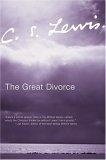the quotes may seem quite discrete and 'out of nowhere', that's why they're my notes and not yours =P. i hope you're not satisfied with these dialogues to a point that you eventually pick up
*************************************************************
Don't you remember on earth --- there were things too hot to touch with your finger but you could drink them all right? Shame is like that. If you will accept it --- if you will drink the cup to the bottom --- you will find it very nourishing: but try to do anything else with it and it scalds. (what a nice analogy on 'shame'.)
They say of some temporal suffering, "No future bliss can make up for it," not knowing that Heaven, once attained, will work backwards and turn even that agony into a glory. And of some sinful pleasure they say "Let me have but this and I'll take the consequences": little dreaming how damnation will spread back and back into their past and contaminate the pleasure of the sin. Both processes begin even before death. The good man's past begins to change so that his forgiven sins and remembered sorrows take on the quality of Heaven: the bad man's past already conforms to his badness and is filled only with dreariness. And that is why, at the end of all things, when the sun rises here and the twilight turns to blackness down there, the Blessed will say "We have never lived anywhere except in Heaven," and the Lost, "We were always in Hell." And both will speak truly.
(his stance against "No future bliss can make up for it," for sure reminded me of Paul's comments on love, that "it keeps no record of wrongs". i used to find that impossible to believe; some hurts can never by wipped away; but little did i know that love, instead of wipping away, heals. and by perceiving our deeds as processes Lewis saved us from the dualism that separates an act and its consequences, a good slap on the face even for the great Constantine.)
There have been men before now who got so interested in proving the existence of God that they came to care nothing for God Himself...as if the good Lord had nothing to do but exist! There have been some who were so occupied in spreading Christianity that they never gave a thought to Christ. Man! Ye see it in smaller matters. Did ye never know a lover of books that with all his first editions and signed copies had lost the power to read them? Or an organizer of charities that had lost all love for the poor? It is the subtlest of all the snares. (points can't be clearer)
There are only two kinds of people in the end: those who say to God, "Thy will be done," and those to whom God says, in the end, "They will be done." All that are in Hell, choose it. Without that self-choice there could be no Hell. No soul that seriously and constantly desires joy will ever miss it. Those who seek find. To those who knock it is opened.
(yes, i do see the underlying theological preference, Lewis is quite unlikely a Calvinist on the topic of predestination. but a great quote nonetheless: "there are only two kinds of people in the end", that indeed is the case)
Those that hate goodness are sometimes nearer than those that know nothing at all about it and think they have it already. (thanks for the slap on the face. ouch, but i will remember to stay close to You, Lord.)
Every poet and musician and artist, but for Grace, is drawn away from love of the thing he tells, to love of the telling till, down in Deep Hell, they cannot be interested in God at all but only in what they say about Him...They sink lower --- become interested in their own personalities and then in nothing but their own reputations. (to know about God v.s. to walk with God)
No natural feelings are high or low, holy or unholy, in themselves. They are all holy when God's hand is on the rein. They all go bad when they set up on their own and make themselves into false gods...And yet all loneliness, angers, hatreds, envies and itchings that it contains, if rolled into one singe experience and put into the scale against the least moment of the joy that is felt by the least in Heaven, would have no weight that could be registered at all. Bad cannot succeed even in being bad as truly as good is good. (i had the thought but never the articulation to put into words, thx Lewis!)
For every attempt to see the shape of eternity except through the lens of Time destroys your knowledge of Freedom. Witness the doctrine of Predestination which shows (truly enough) that eternal reality is not waiting for a future in which to be real; but at the price of removing Freedom which is the deeper truth of the two. And wouldn’t Universalism do the same? Ye cannot know eternal reality by a definition. Time itself, and all acts and events that fill Time, are the definition, and it must be lived. (an elboration of his stance on Predestination, now i see his point better, though i still don't understand, quite frankly)
*************************************************************
one of the things i like about C.S.Lewis is his creative approach on 'hard issues' like theology. when the topics become too complicated and ideas hard to convey, telling a story might just be your best shot. and Lewis always does it beautifully. a piece of reader's response to share with you (to tell you the truth i don't really expect anyone would read the whole thing....*grin*...keke)
began composing on aug21, 08, finished today =P

related post: souvenirs of Hell
0 回音:
Post a Comment
回音